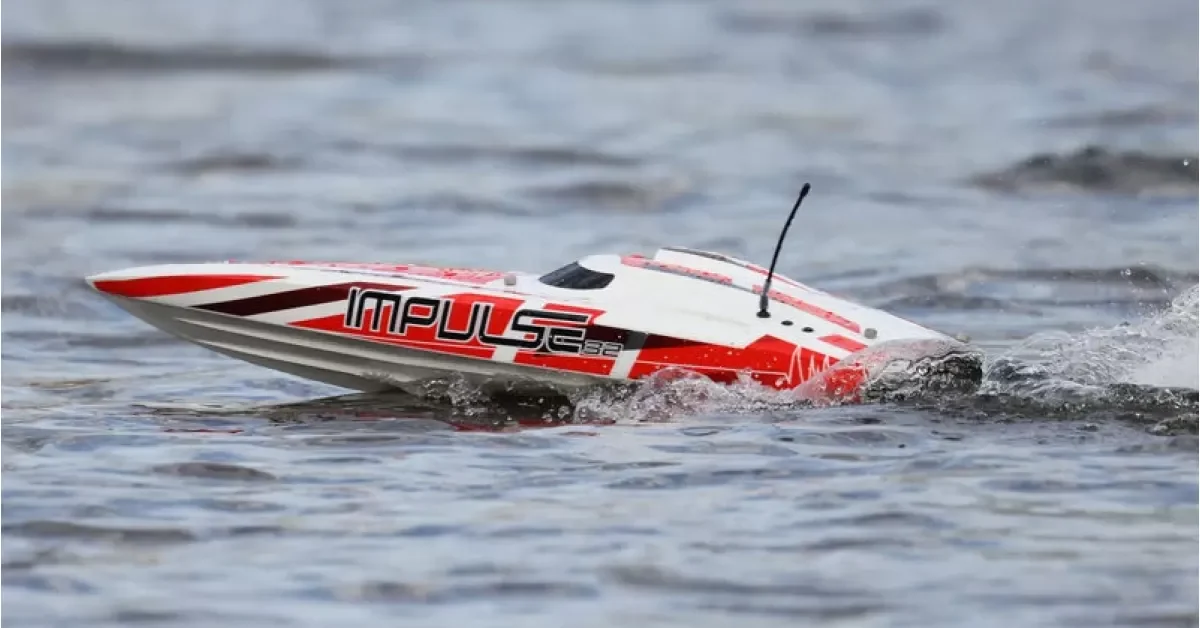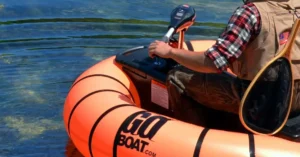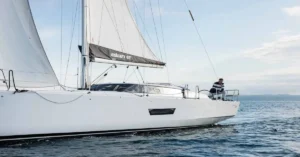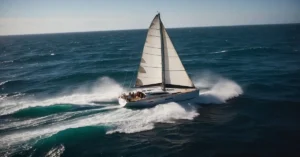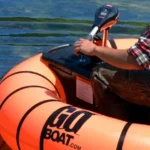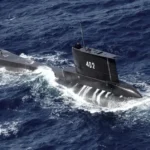Dive into the dynamic realm of gas powered RC boats, the ultimate thrill for hobbyists craving the roar of an engine and the exhilaration of speed. These boats offer a hands-on experience with a mechanical depth that electric models can’t match, requiring actual refueling and engine tuning.
Embrace the challenge and satisfaction of maintaining these powerful vessels, and join a community of enthusiasts passionate about high-performance boating. Whether for competitive racing or the joy of the hobby, gas powered RC boats promise adrenaline-packed adventures on the water.
I revel in the rush of gas powered RC boats, where I tune, race, and bond over our shared high-speed passion.
My Top 3 Gas Powered RC Boats
Regarding the thrill of RC boating, gas powered RC boats offer a fantastic mix of speed and power. Here are my top three picks that embody high-speed thrills on the water:
1. Traxxas Spartan
- Speed: 50 mph
- Engine: Powerful 2-stroke
- Hull: Durable design with adjustable trim tab system
- The Spartan is incredibly thrilling to pilot. Its swift response and robust build quality set the standard in gas powered RC boating. Learn more about this speedster here.
2. Pro Boat Miss GEICO Zelos 36″ Twin
- Top Speed: 75+ mph
- Engine: Dual Zenoah G300PUM
- Hull: Sleek fiberglass build
- If you crave something even more powerful, the Miss GEICO Zelos 36″ Twin’s performance is unparalleled, and its dual engines are music to my ears. Information on its capabilities can be found here.
3. Aquacraft Rio 51z Off-shore RTR Boat
- Setup: Ready-to-run
- Feature: Off-shore capability
- Advantage: Balances speed with stability
- The Rio 51z offers a fantastic ready-to-run experience right out of the box. It balances speed with stability, perfect for those days when I want to conquer the waves rather than race. Explore more about the Rio 51z here.
Understanding Gas Powered RC Boats

When it comes to the thrills of high-speed water racing, gas powered RC boats stand out for their raw power and lasting runtime. I’m excited to guide you through what makes these machines buzz across the water’s surface.
Basics of Gas RC Boats
Gas RC boats are fascinating watercraft that rely on internal combustion engines similar to those found in full-sized boats but scaled down to size. They burn regular gasoline mixed with oil to operate. Most of these remote-controlled boats are substantial in size, often exceeding the one-meter length, which provides stability and allows for the more significant, more powerful gas engines to be installed. Enthusiasts frequently prefer the gas powered engine for its simplicity and the authentic boating experience. They’re also well-known for their ability to run longer sessions on the water between refuels compared to their electric counterparts.
Types of Gas Engines
Gas engines in RC boats come primarily in two-stroke variants, which means they complete a power cycle with two-piston movements. This engine type is known for delivering power efficiently and rapidly, translating to the water’s high-speed potential. The two-stroke gas engine is also preferred due to its relative mechanical simplicity and ease of maintenance.
Gas vs. Electric Models
Choosing between gas and electric models often depends on personal preference and intended use. Gas powered RC boats offer longer run times and a more visceral driving experience, with engine noise and fuel refilling adding to the sense of realism. In contrast, electric motors are quieter, require less maintenance, and are more accessible for beginners. However, they may have shorter run times due to battery life constraints and usually don’t match gasoline-powered boats’ top speed and power.
Components and Design

When it comes to gas powered RC boats, I’m always excited to talk about the intricacies of their design and the components that make them stand out. It’s fascinating how every part comes together to create a high-speed machine that’s as thrilling to watch as it is to control.
Hull Types and Materials
The hull of a gas powered RC boat is its foundation and one of the most critical aspects affecting performance and durability. Popular materials include fiberglass, known for its strength and lightweight properties. Two standard hull designs you’ll encounter are the V-hull and the catamaran. While V-hulls are designed for choppy water conditions, providing better stability and handling, catamarans, with their wide hull, offer more incredible speed on calm water.
The Drive System Explained
At the heart of these boats lies the drive system, which transfers power from the engine to the shaft and finally to the propeller. Gas powered RC boats typically use a direct drive or a geared system. Direct drives are straightforward, linking the engine directly to the propeller through the shaft. Geared systems can adjust the power output for various performance tweaks.
Propulsion Parts and Their Functions
Let’s pay attention to the propulsion components. Like the tires on a car, the propeller is where the rubber meets the road. Or, in this case, the blade meets the water. The propeller blades’ shape, size, and pitch are critical factors in determining the boat’s thrust and top speed. It’s essential to align the propeller’s characteristics with the boat’s intended use, whether racing around a course or just casual sailing.
Maintenance and Tuning

When diving into the world of gas powered RC boats, ensuring peak performance is about meticulous maintenance and precise tuning. My experience has taught me that a well-maintained boat is reliable, and a well-tuned engine maximizes performance.
Routine Maintenance
Maintenance of gas powered RC boats is fundamental for longevity and consistent performance. Here’s what I do to keep my boat in top shape:
- Inspect and Clean: After each run, I check for debris and clean the hull, propeller, and rudder. Water-resistant grease on the prop shaft helps prevent corrosion.
- Spark Plugs: Regularly checking and replacing the spark plugs ensures the engine starts smoothly and runs efficiently.
- 2-Cycle Oil: Using a high-quality 2-cycle oil in the correct ratio is crucial for engine lubrication and preventing internal damage.
Tuning Your Gas Engine for Performance
For tuning, the carburetor and tuned pipe are my main focuses:
- Carburetor Adjustment: I adjust the carburetor for the optimal fuel-air mix, drastically affecting acceleration and top speed.
- Tuned Pipe: Aligning the tuned pipe correctly enhances the engine’s power band, making a noticeable difference in performance.
Troubleshooting Common Issues
Occasional issues crop up, but here’s how I deal with them:
- Engine Troubles: If the engine doesn’t start, I check the spark plug and carburetor settings first, as they’re often the culprits.
- Fuel Problems: Ensuring the fuel is fresh, and the lines are clear of obstructions is key—stale fuel or clogged lines can stop a boat dead in its tracks.
- Durability Concerns: Regularly tightening screws and applying thread-locker where necessary helps maintain the durability of my gas powered RC boat.
Routine attention and fine-tuning are the perfect duo to enjoy the thrills of gas powered RC boats without a hitch.
Operating and Enjoying Your RC Boat

When I started navigating the waters with gas powered RC boats, I quickly learned there’s more to it than just the thrill of speed. It’s about the intricate dance of safety, performance, and community.
Safety First: Operating Precautions
Operating gas boats is exhilarating, but safety precautions are paramount. Before setting sail, I always:
- Check my radio system to ensure a clear signal.
- Inspect the RC boat engine and fuel lines.
- Wear a life jacket when near water, even though I’m not on the boat.
- Keep spectators at a safe distance to protect them from high speeds.
It’s best to be proactive and adhere to local regulations regarding gas powered boats to avoid any mishaps.
Maximizing Run Times and Speed
Understanding fuel usage and maintenance is critical to get the most out of my boating sessions. Here’s what I focus on:
- Use a quality lipo battery charger for efficient charging.
- Ensuring the battery is correctly charged for longer run times.
- Tuning the RC boat engine for optimal performance and speed.
- Following the manufacturer’s instructions for the boat kit to maintain the boat’s integrity.
These details make the difference between a good run and a great one.
Joining RC Boating Events and Communities
The realism and excitement of controlling gas boats skyrocket when I participate in events. Joining an RC boating community allowed me to:
- Compete in races, experiencing the buzz of high speeds.
- Share tips on run times and radio systems with fellow enthusiasts.
- Enjoy the camaraderie and shared passion for gas powered boats.
I realized that these gatherings are the perfect way to elevate my experience and knowledge in RC boating.
FAQ – Gas Powered RC Boats

I’m thrilled you’re interested in the exhilarating world of gas powered RC boats! These models are renowned for their power and speed, offering a robust and intriguing hobby. Here are some frequently asked questions that can help you navigate the essentials.
What gas is best for boats?
Gasoline: The best fuel for most gas powered RC boats is high-quality, unleaded gasoline mixed with a specific oil ratio, as the boat’s manufacturer recommends. This blend ensures the engine runs smoothly and prolongs its life.
How does an RC boat work?
Mechanics: RC boats are operated remotely using a transmitter that communicates with a receiver on the boat. When I control the throttle or rudder on the transmitter, it sends signals to the servos in the boat, adjusting the speed and direction.
Can you put regular gas in a boat?
Fuel type: Yes, you can use regular gasoline in many gas powered RC boats, but it’s vital to mix it with two-stroke oil in the ratio specified by the boat’s manufacturer to maintain proper engine function and avoid damage.
How fast can an RC boat go?
Speed Ranges: The speed of gas powered RC boats varies considerably. Standard models typically reach 20 to 30 miles per hour, while some high-performance boats can surge up to around 100 miles per hour, offering an intense racing experience.
Join the wave of excitement! Share your experiences and thoughts on the latest in gas powered RC boats for 2024 in the comments below—let’s make some ripples together!

